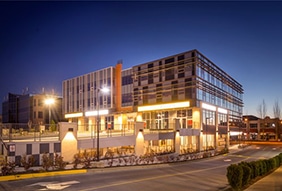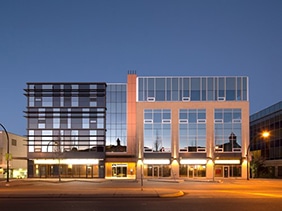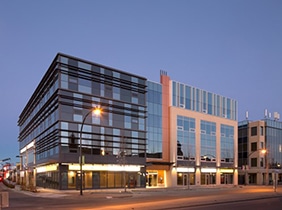Surrey’s The Offices at Newton, a mixed-use building certifies LEED Platinum
Vancouver, British Columbia
January 11, 2014
- Rating System/Standard
- LEED v1
- Certification Level
- Platinum
- Building Type
- Office
We spoke to April Mackoff, Associate Director, Development & Legal Affairs for The Value Group of Companies, about this project and how its unique approaches to sustainability led to it certifying LEED Platinum.
1. Tell us about the project and its unique features, particularly those that led to it certifying LEED Platinum.
The Offices at Newton is a four-story, 45,000 square foot, mixed-use office and retail building situated in Surrey, British Columbia, a municipality located approximately 40 minutes southeast of Vancouver. With a diverse population of more than half a million people, Surrey is one of the fastest growing cities in North America and is projected to almost double in size over the next thirty years.
In 2006, Centre of Newton Property Inc., a company owned and operated by the Value Property Group, purchased a large commercial redevelopment site in the Newton area of Surrey. Less than two years later, we constructed Phase I of the development: a now extremely successful, 80,000 square foot grocery-anchored, retail shopping center. Phase II of the development, known as The Offices at Newton, was built in 2013 on a portion of the site used as a surface parking lot.

Prior to redeveloping the Phase II site, our team recognized that the rapidly densifying Newton lacked Class A office buildings. We believed that a state-of-the-art office building constructed to the highest energy efficiency standards would beautifully complement both the Phase I retail development, as well as the surrounding Newton community. In addition, following completion of Phase I but prior to commencement of Phase II, we completed construction of a pre-leased LEED Gold designated office building in Surrey’s central business district. We recognized the long-term value of a LEED designated building and the benefits that it offers to prospective tenants, particularly in the cost savings directly attributed to maximized energy performance and improved indoor air quality.
The Offices at Newton contains numerous sustainable building features, which collectively led to its LEED Platinum certification, which include:
- Energy modeling to maximize performance of the envelope, glazing and mechanical systems resulting in a 46% energy cost savings over the same sized baseline building;
- Energy conservation measures including increased insulation in the building envelope, high performance windows, reduced interior and exterior lighting power density, energy recovery ventilator with exhaust air heat recovery, ground source heat pump system, and low flow faucets and shower heads;
- Fifty four water to air heat pumps to heat and cool the building;
- Two Kone Eco Space elevators that maximize speeds for the height of the building and regenerate electricity for the building when a cab is travelling up or down empty;
- A white reflective roof to cool the building; High water efficiency fixtures and waterless urinals located in all male and unisex bathrooms;
- A low flow drip irrigation system that services native and drought tolerant plantings;
- Regionally sourced and recycled content building materials. 100% of the wood in the building is FSC certified. Materials and finishes have also been chosen to ensure no or low emitting volatile organic compounds;
- Seven secured bike lockers, lockers for rider’s gear, and male and female shower rooms; and
- Six electric vehicle car charging stations.

2. Why did you choose LEED certification (and not a less rigorous form of green standard or just building to code)?
LEED certification is arguably the most prominent, exacting and trusted third-party verification program for measuring building sustainability. Although our company understood that pursuing LEED certification would increase our initial design and construction costs, we also recognized that LEED certification would yield significant operational cost savings and marketing opportunities over the life cycle of the building.
3. What value does LEED certification bring to your building, as an owner and/or property manager and/or for those the tenants who occupy it?
LEED Platinum certification readily distinguishes our product from our market competitors. Prospective tenants recognize the LEED rating system and understand that a LEED Platinum certified building offers the healthiest possible work environment for their employees, which directly translates into increased productivity gains.
4. What was the biggest lesson learned from building a LEED project that you think would be valuable to others building LEED?
The CaGBC encourages developers targeting LEED certified projects to incorporate an Integrated Design Process (IDP) into their overall design and development strategies. The IDP encourages collaboration and knowledge sharing between stakeholders early and often during the design phase of the development process. We found the IDP to be a valuable exercise, which ultimately led to a more cost effective and sustainable product. We would encourage other developers who are targeting LEED certified buildings to embrace the IDP’s support for dialogue exchanges between consultants, clear decision-making and holistic solutions.
5. Is there anything else you’d like to add about your building or LEED in general?

Like many municipalities, the City of Surrey currently does not require developers to achieve LEED certification for new commercial construction. Therefore, commercial developers like the Value Property Group have chosen to build LEED designated buildings because we are committed to sustainable design, reducing our environmental footprint and a triple bottom line. As integral partners in the development community, local governments should offer a wide range of incentive programs for developers who are willing to exceed minimum building code requirements, including reduced application fees, density bonuses, expedited permitting and tax credits/abatements.